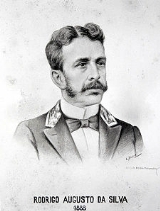
Rodrigo Augusto da Silva
Encyclopedia
Rodrigo Augusto da Silva (Sao Paulo
, December 7, 1833 — October 17, 1889) a Brazilian senator for life
, minister and a privy counsellor of Emperor Peter II of Brazil
. He was a member of the Silva de Carvalho family from São Paulo
, the son of José Manuel da Silva (Baron of Tiete) and nephew of financier
Benedito Antonio da Silva. Senator Silva is best known as the minister that authored and countersigned with Princess Isabel, then Princess Imperial Regent of Brazil
the Golden Law (Lei Áurea
); this law ended slavery in Brazil
and in consequence the Western world
. Together with his friend Antonio da Silva Prado and the Viscount of Maua
he was among the promoters of the industrialization of Brazil.
Rodrigo da Silva had to defend it in the parliament on May 9, 1888. He received heavy attacks from members of his own party. The discussion became emotive and even attacks on the character of the Minister were exposed by other parliamentarians, they pointed that he was once against abolition. Answering to one of these parliamentarians Rodrigo da Silva said:“Compared to a question of this magnitude, all individualities are mere demean.” Joaquim Nabuco
came to his rescue and added: “Or ennoble, such is the case of your Excellency” Rodrigo da Silva ended the discussion with these words: After the speech people screamed: Well Done! Well Done! And applause could be heard from the galleries upstairs.
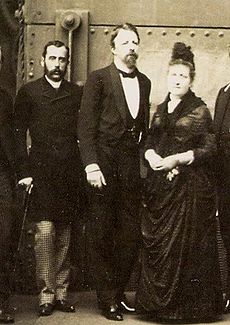 A total of 83 Parliamentarians voted yes and only the following voted against it: Barao de Aracaji, Bulhoes Carvalho, Castrioto, Pedro Luiz, Bezamat, Alfredo Chaves, Lacerda Werneck, Andrade Figueira and Cunha Leitao.
A total of 83 Parliamentarians voted yes and only the following voted against it: Barao de Aracaji, Bulhoes Carvalho, Castrioto, Pedro Luiz, Bezamat, Alfredo Chaves, Lacerda Werneck, Andrade Figueira and Cunha Leitao.
As a result of the Golden Law (Lei Aurea), the Conservative government was divided internally and the opposition (Liberals/Republicans) used the opportunity to try to grab power again. Opposition was so strong that the government and Senator Silva lost political support, and the House of Braganza-Orleans would lose the Crown of Brazil in less than two years after the abolition.
In contrast to the opposition faced in Brazil, Senator Silva and Princess Isabel were highly regarded outside Brazil. Senator da Silva was honored by the Vatican, France and Portugal and Isabel received a Gold Rose from the Pope for the courage showed in freeing the slaves. Senator Rodrigo da Silva was awarded the maximum honor of the French nation, the grand cross of the Legion of Honor
, the Pope
gave him the Grand-cross of first class of the Order of St. Gregory the Great
, and Portugal
gave him an honor normally reserved to the royal family the Grand-cross of the Royal Order of the Immaculate Conception of Vila Viçosa
. On the 31st of May 1889 the State Council meets with the Emperor. State Councilors Lafaiete Rodrigues Pereira and Paulino Jose Soares de Sousa strongly attacked the Joao Alfredo Cabinet and specially the actions of the Ministers of Agriculture Rodrigo Silva and Antonio da Silva Prado.
Senator Soares de Souza attacked Senators Rodrigo Silva and Antonio Prado saying:
“The most profound discontentment reigns in the conservative classes, the most numerous and influent, the plantation owners that the irreversible act of 13th of May of last year left without any reparation of the violated right ... In the centers of agriculture has been growing republican propaganda, gaining victories, such as the last election of deputies sent to Congress by the province of Minas Gerais…"
(Atas do Conselho de Estado Pleno, 31 May 1889)
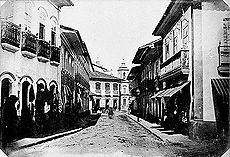 Senator Rodrigo was a descendant of Portuguese aristocratic families, among them the Silveira Bettencourt (see Jean de Béthencourt
Senator Rodrigo was a descendant of Portuguese aristocratic families, among them the Silveira Bettencourt (see Jean de Béthencourt
), Cunha Gago (descendant of Fruela II of León
) and Silva de Carvalho families. Senator Rodrigo’s family was very influential in Sao Paulo for over a century and members of the family were commanders of the militia and members of the municipal chamber of Santo Amaro. Senator Silva’s grandfather was Jose da Silva de Carvalho, he was nominated captain-major
of Santo Amaro by the King of Portugal and latter became a militia commander for a large part of the province of Sao Paulo. He was given the rank of sargento-mor (Portuguese colonial title). The sons of Jose da Silva de Carvalho continued the family tradition and assumed command of the militia, first colonel Jose Manuel da Silva (Baron of Tiete) and latter major Benedito Antonio da Silva.
Senator Silva’s father was given the title of Baron of Tiete by Peter II and was also a commander of the Order of Christ
. He was a senior political figure in Sao Paulo
until his death on the 18th of March 1877, a member of the Provincial assembly and was previously President and 1st Vice-president of the province of Sao Paulo.
 The family built a fortune in the transportation of coffee and latter on railways, factories, banks and utility companies.
The family built a fortune in the transportation of coffee and latter on railways, factories, banks and utility companies.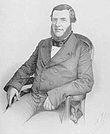 Jose Manuel da Silva and Benedito Antonio da Silva invested heavily in the use of tropas, a form of caravan that used horses and donkeys to transport goods. During the 1860s and 1870’s the family invested with other capitalists such as the Silva Prado family and the Viscount of Maua, in the construction of railway companies in Sao Paulo. Jose Manuel da Silva latter became president of the Bank of Brazil in Sao Paulo. In 1888, Rodrigo’s uncle, major Benedito Antonio da Silva became one of the founding partners in the Docks of Santos Corporation. This company was the largest private investment in Brazil during the Imperial period.
Jose Manuel da Silva and Benedito Antonio da Silva invested heavily in the use of tropas, a form of caravan that used horses and donkeys to transport goods. During the 1860s and 1870’s the family invested with other capitalists such as the Silva Prado family and the Viscount of Maua, in the construction of railway companies in Sao Paulo. Jose Manuel da Silva latter became president of the Bank of Brazil in Sao Paulo. In 1888, Rodrigo’s uncle, major Benedito Antonio da Silva became one of the founding partners in the Docks of Santos Corporation. This company was the largest private investment in Brazil during the Imperial period.
In his youth Rodrigo da Silva benefited from his father’s wealth and had the best education available in Sao Paulo. He was fluent in different languages and graduated from Law school in the Largo Sao Francisco in Sao Paulo. During his career in the national capital of Rio de Janeiro the press used to draw his caricature as an elitist not concerned with the people as a result of his aristocratic upbringing.
Rodrigo da Silva married Catharina Mattoso da Camara in Rio de Janeiro on June 1859, daughter of the aristocrat and senator, Eusebio de Queiros. The senator was responsible for the law that forbade the slave trade in the South Atlantic between Africa and Brazil, the law was passed in 1850.
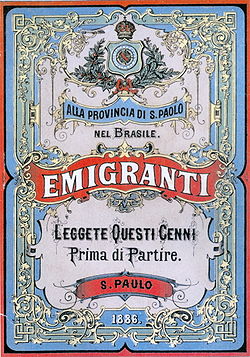 In 1888 as Minister of Agriculture, Commerce and Public works he negotiated with the house of Rothschild in London the sale of Brazilian bonds to finance infrastructure in Brazil. This specific issue was valued at 6 million pounds. In the same year Senator Silva and his political allied Antonio da Silva Prado implemented a plan to attract immigrants from Europe
In 1888 as Minister of Agriculture, Commerce and Public works he negotiated with the house of Rothschild in London the sale of Brazilian bonds to finance infrastructure in Brazil. This specific issue was valued at 6 million pounds. In the same year Senator Silva and his political allied Antonio da Silva Prado implemented a plan to attract immigrants from Europe
to Brazil. Senator Silva and Senator Silva Prado were very successful and during their years as Ministers of Agriculture and of Foreign Affairs one of the largest influxes of immigrants in history was established in Brazil (see Italian Brazilians and Portuguese Brazilians). A large Italian colony in the state of Minas Gerais
was named in his honor.
As Minister of Foreign affairs Rodrigo da Silva negotiated with Argentina
the division of the Mission territories, and subsequently accepted the arbitration of the president of the United States
. A treaty for the arbitration was signed in Buenos Aires on September 7, 1889. Baron of Rio Branco would later conclude the negotiations between the republican government of Brazil and Argentina. The decision was in favor of Brazil.
strongly attacked Rodrigo da Silva and published numerous articles in the press against him. Ruy Barbosa was a secret republican in opposition to Rodrigo, a strong supporter of the Emperor and the House of Braganza
.
Rodrigo was also criticized by Campos Sales (later president of Brazil) for his strong friendship and protection of Gaston of Orléans, Count d'Eu and Isabel of Brazil. Campos Sales and other republicans believed that the Count d'Eu (French prince and husband of Isabel of Brazil) was trying to become head of state.
The New York Times published the following regarding his death on the 24th of November 1889:
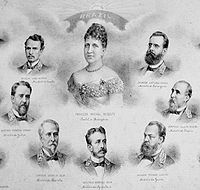 Senator Silva received the following orders of knighthood:
Senator Silva received the following orders of knighthood:
Grand-cross of the Royal Order of the Immaculate Conception of Vila Viçosa
-Portugal
Grand-cross of first class of the Order of Saint Gregory the Great-Vatican
Grand-cross of the French Legion of Honor-France http://www.senado.gov.br/sf/SENADORES/senadores_biografia.asp?codparl=2223&li=20&lcab=1886-1889&lf=20
A district in Ouro Preto
, Minas Gerais
was named in his honor, known as Rodrigo Silva.
A large Italian colony in the state of Minas Gerais
was named Senator Rodrigo Silva.
Many streets in Brazil are named after Senator Rodrigo da Silva, especially in his native state of Sao Paulo.
Machado de Assis wrote a chronicle about the abolition of slavery; Senator Rodrigo da Silva is mentioned in the chronicle.
He also appears in the writings of Ruy Barbosa
, Viscount of Taunay and Humberto de Campos.
São Paulo
São Paulo is the largest city in Brazil, the largest city in the southern hemisphere and South America, and the world's seventh largest city by population. The metropolis is anchor to the São Paulo metropolitan area, ranked as the second-most populous metropolitan area in the Americas and among...
, December 7, 1833 — October 17, 1889) a Brazilian senator for life
Senator for life
A senator for life is a member of the senate or equivalent upper chamber of a legislature who has life tenure. , 7 Italian Senators out of 322, 4 out of the 47 Burundian Senators and all members of the British House of Lords have lifetime tenure...
, minister and a privy counsellor of Emperor Peter II of Brazil
Pedro II of Brazil
Dom Pedro II , nicknamed "the Magnanimous", was the second and last ruler of the Empire of Brazil, reigning for over 58 years. Born in Rio de Janeiro, he was the seventh child of Emperor Dom Pedro I of Brazil and Empress Dona Maria Leopoldina and thus a member of the Brazilian branch of...
. He was a member of the Silva de Carvalho family from São Paulo
São Paulo
São Paulo is the largest city in Brazil, the largest city in the southern hemisphere and South America, and the world's seventh largest city by population. The metropolis is anchor to the São Paulo metropolitan area, ranked as the second-most populous metropolitan area in the Americas and among...
, the son of José Manuel da Silva (Baron of Tiete) and nephew of financier
Financier
Financier is a term for a person who handles typically large sums of money, usually involving money lending, financing projects, large-scale investing, or large-scale money management. The term is French, and derives from finance or payment...
Benedito Antonio da Silva. Senator Silva is best known as the minister that authored and countersigned with Princess Isabel, then Princess Imperial Regent of Brazil
Isabel, Princess Imperial of Brazil
Dona Isabel , nicknamed "the Redemptress", was the heiress presumptive to the throne of the Empire of Brazil, bearing the title of Princess Imperial....
the Golden Law (Lei Áurea
Lei Áurea
The Lei Áurea , adopted on May 13, 1888, was the law that abolished slavery in Brazil.It was preceded by the Rio Branco Law of September 28, 1871 , which freed all children born to slave parents, and by the Saraiva-Cotegipe Law , of September 28, 1885, that freed slaves when they reached the age of...
); this law ended slavery in Brazil
Slavery in Brazil
Slavery in Brazil shaped the country's social structure and ethnic landscape. During the colonial epoch and for over six decades after the 1822 independence, slavery was a mainstay of the Brazilian economy, especially in mining, cotton, and sugar cane production.Brazil obtained an estimated 35% of...
and in consequence the Western world
Western world
The Western world, also known as the West and the Occident , is a term referring to the countries of Western Europe , the countries of the Americas, as well all countries of Northern and Central Europe, Australia and New Zealand...
. Together with his friend Antonio da Silva Prado and the Viscount of Maua
Irineu Evangelista de Sousa
Irineu Evangelista de Sousa, the Viscount of Mauá was a Brazilian entrepreneur, industrialist, banker and politician. He was called the Rothschild of the South American continent by the New York Times in 1871. He received the titles of baron and visconde com grandeza of Mauá...
he was among the promoters of the industrialization of Brazil.
Golden Law
In order to approve the Golden LawLei Áurea
The Lei Áurea , adopted on May 13, 1888, was the law that abolished slavery in Brazil.It was preceded by the Rio Branco Law of September 28, 1871 , which freed all children born to slave parents, and by the Saraiva-Cotegipe Law , of September 28, 1885, that freed slaves when they reached the age of...
Rodrigo da Silva had to defend it in the parliament on May 9, 1888. He received heavy attacks from members of his own party. The discussion became emotive and even attacks on the character of the Minister were exposed by other parliamentarians, they pointed that he was once against abolition. Answering to one of these parliamentarians Rodrigo da Silva said:“Compared to a question of this magnitude, all individualities are mere demean.” Joaquim Nabuco
Joaquim Nabuco
Joaquim Aurélio Barreto Nabuco de Araújo was a Brazilian writer, statesman, and a leading voice in the abolitionist movement of his country.-Biography:...
came to his rescue and added: “Or ennoble, such is the case of your Excellency” Rodrigo da Silva ended the discussion with these words: After the speech people screamed: Well Done! Well Done! And applause could be heard from the galleries upstairs.

As a result of the Golden Law (Lei Aurea), the Conservative government was divided internally and the opposition (Liberals/Republicans) used the opportunity to try to grab power again. Opposition was so strong that the government and Senator Silva lost political support, and the House of Braganza-Orleans would lose the Crown of Brazil in less than two years after the abolition.
In contrast to the opposition faced in Brazil, Senator Silva and Princess Isabel were highly regarded outside Brazil. Senator da Silva was honored by the Vatican, France and Portugal and Isabel received a Gold Rose from the Pope for the courage showed in freeing the slaves. Senator Rodrigo da Silva was awarded the maximum honor of the French nation, the grand cross of the Legion of Honor
Légion d'honneur
The Legion of Honour, or in full the National Order of the Legion of Honour is a French order established by Napoleon Bonaparte, First Consul of the Consulat which succeeded to the First Republic, on 19 May 1802...
, the Pope
Pope
The Pope is the Bishop of Rome, a position that makes him the leader of the worldwide Catholic Church . In the Catholic Church, the Pope is regarded as the successor of Saint Peter, the Apostle...
gave him the Grand-cross of first class of the Order of St. Gregory the Great
Order of St. Gregory the Great
The Pontifical Equestrian Order of St. Gregory the Great , was established on September 1, 1831, by Pope Gregory XVI, seven months after his election.It is one of the five orders of knighthood of the Holy See...
, and Portugal
Portugal
Portugal , officially the Portuguese Republic is a country situated in southwestern Europe on the Iberian Peninsula. Portugal is the westernmost country of Europe, and is bordered by the Atlantic Ocean to the West and South and by Spain to the North and East. The Atlantic archipelagos of the...
gave him an honor normally reserved to the royal family the Grand-cross of the Royal Order of the Immaculate Conception of Vila Viçosa
Order of the Immaculate Conception of Vila Viçosa
The Order of the Immaculate Conception of Vila Viçosa is an dynastic order of knighthood of the House of Braganza, the former Portuguese Royal Family...
. On the 31st of May 1889 the State Council meets with the Emperor. State Councilors Lafaiete Rodrigues Pereira and Paulino Jose Soares de Sousa strongly attacked the Joao Alfredo Cabinet and specially the actions of the Ministers of Agriculture Rodrigo Silva and Antonio da Silva Prado.
Senator Soares de Souza attacked Senators Rodrigo Silva and Antonio Prado saying:
“The most profound discontentment reigns in the conservative classes, the most numerous and influent, the plantation owners that the irreversible act of 13th of May of last year left without any reparation of the violated right ... In the centers of agriculture has been growing republican propaganda, gaining victories, such as the last election of deputies sent to Congress by the province of Minas Gerais…"
(Atas do Conselho de Estado Pleno, 31 May 1889)
Family

Jean de Béthencourt
Jean de Béthencourt was a French explorer who, in 1402, led an expedition to the Canary Islands, landing first on the north side of Lanzarote...
), Cunha Gago (descendant of Fruela II of León
Fruela II of León
Fruela II was the King of Asturias from the death of his father, Alfonso III of Asturias, in 910 to his own death. When his father died, the kingdom was divided, with the third son, Fruela, taking the original portion ; the second, Ordoño, taking Galicia; and the eldest, García, taking León...
) and Silva de Carvalho families. Senator Rodrigo’s family was very influential in Sao Paulo for over a century and members of the family were commanders of the militia and members of the municipal chamber of Santo Amaro. Senator Silva’s grandfather was Jose da Silva de Carvalho, he was nominated captain-major
Captain-major
Captain-major is the English rendering of the Portuguese title Capitão-mor for colonial officers, put in charge of a capitania, Portuguese possession deemed not important enough to have its own colonial Governor.Due to the impossibility of exercising direct control and sovereignty over islands,...
of Santo Amaro by the King of Portugal and latter became a militia commander for a large part of the province of Sao Paulo. He was given the rank of sargento-mor (Portuguese colonial title). The sons of Jose da Silva de Carvalho continued the family tradition and assumed command of the militia, first colonel Jose Manuel da Silva (Baron of Tiete) and latter major Benedito Antonio da Silva.
Senator Silva’s father was given the title of Baron of Tiete by Peter II and was also a commander of the Order of Christ
Order of Christ
Order of Christ may refer to:* Order of Christ – former Knights Templar Order awarded initially by the kings of Portugal, now by the Portuguese state...
. He was a senior political figure in Sao Paulo
São Paulo
São Paulo is the largest city in Brazil, the largest city in the southern hemisphere and South America, and the world's seventh largest city by population. The metropolis is anchor to the São Paulo metropolitan area, ranked as the second-most populous metropolitan area in the Americas and among...
until his death on the 18th of March 1877, a member of the Provincial assembly and was previously President and 1st Vice-president of the province of Sao Paulo.


In his youth Rodrigo da Silva benefited from his father’s wealth and had the best education available in Sao Paulo. He was fluent in different languages and graduated from Law school in the Largo Sao Francisco in Sao Paulo. During his career in the national capital of Rio de Janeiro the press used to draw his caricature as an elitist not concerned with the people as a result of his aristocratic upbringing.
Rodrigo da Silva married Catharina Mattoso da Camara in Rio de Janeiro on June 1859, daughter of the aristocrat and senator, Eusebio de Queiros. The senator was responsible for the law that forbade the slave trade in the South Atlantic between Africa and Brazil, the law was passed in 1850.
Political career

Europe
Europe is, by convention, one of the world's seven continents. Comprising the westernmost peninsula of Eurasia, Europe is generally 'divided' from Asia to its east by the watershed divides of the Ural and Caucasus Mountains, the Ural River, the Caspian and Black Seas, and the waterways connecting...
to Brazil. Senator Silva and Senator Silva Prado were very successful and during their years as Ministers of Agriculture and of Foreign Affairs one of the largest influxes of immigrants in history was established in Brazil (see Italian Brazilians and Portuguese Brazilians). A large Italian colony in the state of Minas Gerais
Minas Gerais
Minas Gerais is one of the 26 states of Brazil, of which it is the second most populous, the third richest, and the fourth largest in area. Minas Gerais is the Brazilian state with the largest number of Presidents of Brazil, the current one, Dilma Rousseff, being one of them. The capital is the...
was named in his honor.
As Minister of Foreign affairs Rodrigo da Silva negotiated with Argentina
Argentina
Argentina , officially the Argentine Republic , is the second largest country in South America by land area, after Brazil. It is constituted as a federation of 23 provinces and an autonomous city, Buenos Aires...
the division of the Mission territories, and subsequently accepted the arbitration of the president of the United States
President of the United States
The President of the United States of America is the head of state and head of government of the United States. The president leads the executive branch of the federal government and is the commander-in-chief of the United States Armed Forces....
. A treaty for the arbitration was signed in Buenos Aires on September 7, 1889. Baron of Rio Branco would later conclude the negotiations between the republican government of Brazil and Argentina. The decision was in favor of Brazil.
Opposition
Ruy BarbosaRuy Barbosa
Ruy Barbosa de Oliveira was a Brazilian writer, jurist, and politician.Born in Salvador da Bahia, he was a federal representative, senator, Minister of Finance and diplomat. For his distinguished participation in the Hague Peace Conference of 1907, he earned the nickname "Eagle of the Hague"...
strongly attacked Rodrigo da Silva and published numerous articles in the press against him. Ruy Barbosa was a secret republican in opposition to Rodrigo, a strong supporter of the Emperor and the House of Braganza
House of Braganza
The Most Serene House of Braganza , an important Portuguese noble family, ruled the Kingdom of Portugal and its colonial Empire, from 1640 to 1910...
.
Rodrigo was also criticized by Campos Sales (later president of Brazil) for his strong friendship and protection of Gaston of Orléans, Count d'Eu and Isabel of Brazil. Campos Sales and other republicans believed that the Count d'Eu (French prince and husband of Isabel of Brazil) was trying to become head of state.
Death
The death of Senator Rodrigo da Silva was a great surprise in Brazil since he was only 55 years old. It was a hard blow for the House of Braganza since they strongly needed people that they could trust in the Senate. He died a month before Republicans implemented a coup and dethroned Peter II.The New York Times published the following regarding his death on the 24th of November 1889:
We have to record the death of another prominent man in Brazilian politics, that of Counselor Rodrigo Augusto da Silva, which took place at his residence in this city (Rio de Janeiro), at 8:30 P.M. on the 17th inst. He was a prominent and popular member of the Conservative party, a native of Sao Paulo, which province he represented in the Senate, and had twice occupied positions in the Imperial Cabinet. He was Minister of Agriculture in the Joao Alfredo Cabinet which passed the abolition law of 1888, and was still in the prime of life.
Honors and Public Homage

Grand-cross of the Royal Order of the Immaculate Conception of Vila Viçosa
Order of the Immaculate Conception of Vila Viçosa
The Order of the Immaculate Conception of Vila Viçosa is an dynastic order of knighthood of the House of Braganza, the former Portuguese Royal Family...
-Portugal
Grand-cross of first class of the Order of Saint Gregory the Great-Vatican
Grand-cross of the French Legion of Honor-France http://www.senado.gov.br/sf/SENADORES/senadores_biografia.asp?codparl=2223&li=20&lcab=1886-1889&lf=20
A district in Ouro Preto
Ouro Preto
-History:Founded at the end of the 17th century, Ouro Preto was originally called Vila Rica, or "rich village," the focal point of the gold rush and Brazil's golden age in the 18th century under Portuguese rule....
, Minas Gerais
Minas Gerais
Minas Gerais is one of the 26 states of Brazil, of which it is the second most populous, the third richest, and the fourth largest in area. Minas Gerais is the Brazilian state with the largest number of Presidents of Brazil, the current one, Dilma Rousseff, being one of them. The capital is the...
was named in his honor, known as Rodrigo Silva.
A large Italian colony in the state of Minas Gerais
Minas Gerais
Minas Gerais is one of the 26 states of Brazil, of which it is the second most populous, the third richest, and the fourth largest in area. Minas Gerais is the Brazilian state with the largest number of Presidents of Brazil, the current one, Dilma Rousseff, being one of them. The capital is the...
was named Senator Rodrigo Silva.
Many streets in Brazil are named after Senator Rodrigo da Silva, especially in his native state of Sao Paulo.
Machado de Assis wrote a chronicle about the abolition of slavery; Senator Rodrigo da Silva is mentioned in the chronicle.
He also appears in the writings of Ruy Barbosa
Ruy Barbosa
Ruy Barbosa de Oliveira was a Brazilian writer, jurist, and politician.Born in Salvador da Bahia, he was a federal representative, senator, Minister of Finance and diplomat. For his distinguished participation in the Hague Peace Conference of 1907, he earned the nickname "Eagle of the Hague"...
, Viscount of Taunay and Humberto de Campos.
External links
- Historia das Ruas de Sao Paulo (Doutor Rodrigo Silva) -
- Brazilian Senate (Biography of Senator Rodrigo Silva) -
- Assembleia Legislativa de Sao Paulo (Biography of Senator Rodrigo Silva) -
- Estacoes Ferroviarias do Brasil (Rodrigo Silva District, Ouro Preto MG) -
- Jornal Tribuna Livre de Ouro Preto (Rodrigo Silva District, Ouro Preto MG) -
- Minas Gerais Public Archives - Government of Minas Gerais (Rodrigo Silva Italian Colony, Barbacena MG) -
- http://books.google.com.br/books?id=R28K2JA9PM8C&printsec=frontcover&dq="The+Brazil+Reader"The Brazil reader by Robert M. LevineRobert M. LevineRobert M. Levine was an American historian, Gabelli Senior Scholar in the Arts and Sciences, Director of Latin American Studies, and professor of history at the University of Miami....
, John J. Crocitti (Duke University Press)] -

